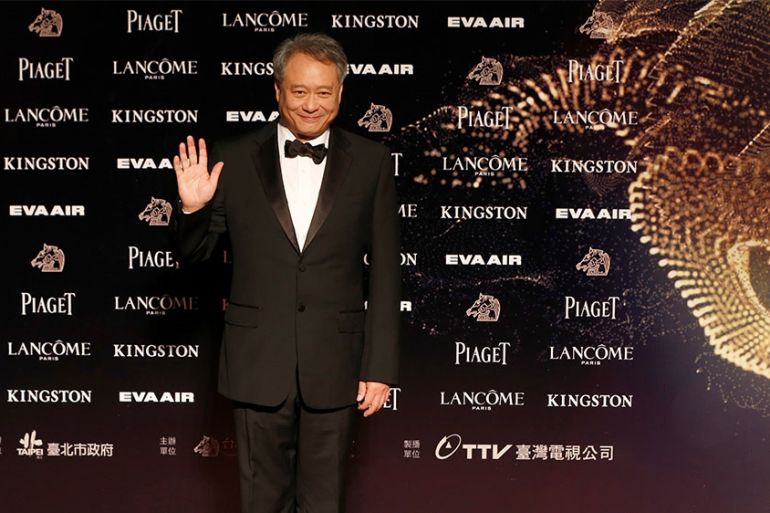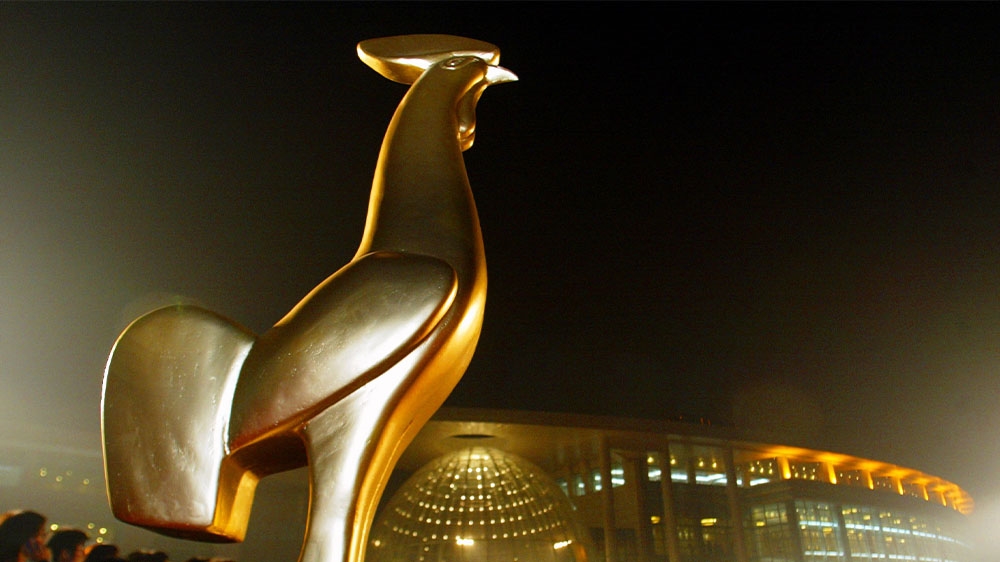China boycott boosts ‘Oscars’ of Chinese-language cinema
Experts say China withdrawal from Golden Horse Awards has raised annual event’s international profile.

Taipei, Taiwan – The leading lights of the Chinese-language film industry will take to the stage in Taiwan on Saturday night for the annual Golden Horse Awards, but mainland Chinese filmmakers will be absent after the country boycotted the event amid simmering cross-strait tensions.
The 56th awards, named after two Taiwanese-controlled islands and dubbed the ‘Oscars’ of Chinese-language film, will be announced in Taipei on November 23. Oscar-winning film director Ang Lee is, once again, chairing the festival.
Keep reading
list of 4 itemsInside the pressures facing Quebec’s billion-dollar maple syrup industry
‘Accepted in both [worlds]’: Indonesia’s Chinese Muslims prepare for Eid
Photos: Mexico, US, Canada mesmerised by rare total solar eclipse
While the mainland will be unrepresented and an important sponsor has pulled out, movie experts say the ceremony itself could still benefit.
Chris Berry, professor of film studies at King’s College London, who studied Chinese and East Asian cinema and screen cultures, said the ban would mean the awards would get “even more attention than usual” going well beyond those with a special interest in Chinese film.
“It’s a worldwide news item, a whole new set of people will be interested,” Berry told Al Jazeera.
|
|
Relations between Taiwan and mainland China, which sees the island as its own, have deteriorated as the democratic island prepares for elections in January and China asserts its claims over the South China Sea.
Protracted protests in support of democracy in Hong Kong have also darkened the political mood.
The Golden Horse Awards were started in 1962 to encourage Hong Kong filmmakers to produce Mandarin-speaking features as a means of supporting the Nationalists, who had established a government on Taiwan (known officially as the Republic of China) after the Communists won the civil war in 1949, said Daw-Ming Lee, director of the MFA in film, television and digital media at the Hong Kong Baptist University’s Academy of Film.
But when films began to be recognised for their artistic achievements and creativity, and the event was opened to all Chinese-language filmmakers in the mid-1990s, the ceremony acquired increasing significance for the industry.
“The Golden Horse Awards certainly is well-known to all cineastes of Chinese-speaking films around the globe,” Lee said. “It has put Taiwan on the world’s cinema map.”
Controversy in 2018
In last year’s ceremony, Chinese drama film An Elephant Sitting Still directed by the late Hu Bo won Best Feature Film, while veteran Chinese director Zhang Yimou’s martial arts epic Shadow was nominated in 12 categories.
But the glamour was overshadowed by politics after 36-year-old Taiwanese director Fu Yue, winner of the Best Documentary for Our Youth in Taiwan, took to the stage.
Her film featured two students who had taken part in Taiwan’s 2014 Sunflower Movement, when protesters occupied the island’s parliament opposing a trade deal with China amid fears of Beijing’s increasing influence on Taipei.
“I really hope one day our country will be regarded as an independent entity,” she said as she accepted the award. “This is my biggest wish as a Taiwanese.”
The mention of independence triggered upset among the mainland contingent.

China-born and Singapore-based actress Gong Li, who was the chief judge, refused to join Ang Lee on stage to present the award for best feature film.
Raising the political temperature further, mainland actor Tu Men then referred to Taiwan as “Taiwan, China” angering many Taiwanese.
This August, China’s state film regulator China Film Administration said mainland Chinese filmmakers would not be participating in this year’s awards.
No specific reason was given.
China Daily writer Zhang Zhouxiang blamed the organisers for allowing Fu to “politicise” the event by talking about independence.
“The deeds of certain pro-independence activists from Taiwan have ruined the reputation of their own festival,” Zhang wrote.
Last month, Italian luxury carmaker Maserati took to Weibo, China’s version of Twitter, to pull its support for the event.
Maserati said its initial sponsorship was the work of its Taipei office, that it did not represent the company’s official position and that it respected “China’s territorial integrity, history and culture”. It also pledged to uphold the “one-China principle“.
Maserati did not respond to Al Jazeera’s requests for comment.
Mainland media also reported that luxury jeweller Bulgari and Chinese smartphone manufacturer OPPO also pulled their sponsorship.
Golden Horse organisers did not respond to Al Jazeera’s questions on the issue.

Rise of new generation
While there are no mainland films in the running this year, entries from other parts of the world where there are large Chinese-speaking communities, including Malaysia and Singapore, have increased.
Malaysian-made The Garden of Evening Mists, based on the 2012 Booker Prize-nominated novel of the same name, is competing for Best Narrative Feature. So is Wet Season, a production from Singapore.
In the Best Documentary category, Malaysian documentary The Tree Remembers, an exploration of racism, is aiming for the prize this year.
Lee expects more Chinese-language films made in Southeast Asian countries – including films made in Cambodia and Myanmar which are China’s closest allies in the region – to participate in future Golden Horse Awards. He also expects filmmakers of Chinese-language films in Europe to enter their productions.
Lee also noted the emergence of younger filmmakers.
“A rather large proportion of films in the finalist [list] are made by emerging filmmakers from Taiwan, Hong Kong and Southeast Asian countries,” he told Al Jazeera.
“These young filmmakers, mostly in their 20s and 30s, are the future of Chinese-language films,” he added.

The Golden Horse Awards have become a major soft power event for Taiwan, and even with the withdrawal of the mainland’s film industry there is little competition for its crown as the industry’s most prestigious event, analysts said.
“For many years, the Golden Horse Awards have been known as the leading awards in the Chinese-speaking world, because they have always been the most prominent awards available to Chinese filmmakers from more than one polity,” Berry told Al Jazeera.
“I don’t see a People’s Republic of China event with similar credibility yet, so it will be difficult for them to take over from Golden Horse,” he said.
China started its own Communist Party-backed film ceremony, known as the Golden Rooster Awards, in 1981, while Hong Kong began the annual Hong Kong Film Awards a year later. China has scheduled this year’s Golden Roosters for this weekend.
Lee said while it was “a bit regrettable” that this year’s Golden Horse Awards would take place without the participation of quality films from China, the publicity the decision had generated could also have a positive effect.
“If it takes the boycott by Communist China for the Awards to become more international, so be it,” he said.
“The ban from the PRC government has actually promoted the Awards’ status as a genuine film awards for all Chinese-language films.”